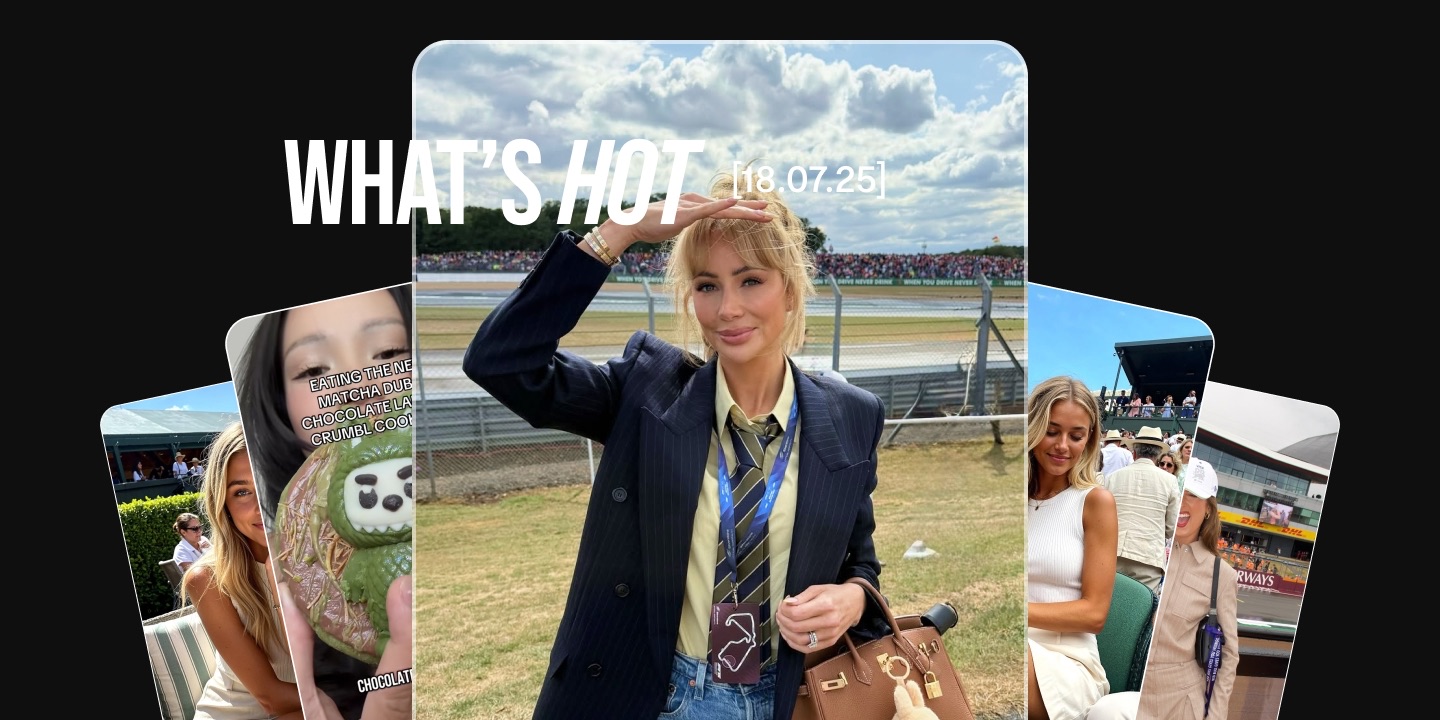
The debate on whether influencers should be invited to exclusive events continues, and TikTok trends have begun intersecting…
Tennis-tok blew up during this years Wimbledon tournament.
From sampling the strawberries and cream and Wimbledon OOTDs, to hilarious people watching clips and courtside BTS, Wimbledon’s owned content, combined with influencer and fan coverage, has engaged a young audience.
This year, Wimbledon’s social accounts fully embraced TikTok trends, entertainment-driven storytelling, inviting creators to attend, and personality-led moments, not just match highlights.
During the first week of the tournament, they achieved over 200 million cumulative views on their official TikTok.
There was a high influencer presence at Wimbledon this year, which shows that brands were tapping into a cultural moment in a way that would resonate with a social media-obsessed audience. However, there was discourse online as to whether influencers deserve a spot at Centre Court and whether they are true tennis fans…
Despite the backlash, many creators took it on the nose and played into the trope that influencers at Wimbledon are there to dress in a cute outfit and take photos for Instagram.
This video from British influencer Kaci Jay, who was invited to the event by BeautyWorks, says, “I thought Wimbledon was just a fashion event with background tennis”.
Another point of contention – sparking a wider debate – was around AI influencers “attending” Wimbledon. Mia Zelu, a “Digital Storyteller & AI Influencer, shared a carousel with her 164k Instagram followers that depicted her enjoying Wimbledon in the same way the IRL guests were – Pimms in hand.
It’s unclear whether a physical ticket holder attended the games to produce AI content or whether it was fabricated outside of the London event, but it has left many people questioning the future of influence, emphasizing that the aim of inviting influencers to cultural events is to generate real content that captures emotions, experiences, and recommendations.
There is certainly a place for AI in Influencer Marketing, as there are incredible tools that can enhance creative content, yet replacing the value of humans entirely detracts from the channel's unique value.
Wimbledon’s embrace of influencers, trends, and social media shows how legacy events can stay relevant by meeting audiences where they are. But as the line between genuine experience and manufactured content blurs, the challenge for brands will be keeping the cultural moment real enough to resonate.
Is it possible for social media trends to be taken too far? So far, that speaking in memes become a new language?
Labubu, Dubai chocolate, brainrot – these have all become a part of the “chronically online” lexicon, and a new trend has arisen that pokes fun at our obsession with social trend culture.
The creator @naterisms achieved over 3 million views on his video that says:
“Pov: It’s 2024, Labubu is president, matcha replaced all water on earth, Benson Boone has won 20 Grammys, Dubai chocolate is the only flavor of food, and Love Island is in season 35”.
Satirical videos are all over the For You page, sparking those who spend hours scrolling through social media every day to have a reality check.
For brands, this is a reminder that overnight virality may seem desirable, but it can quickly crash and burn. An always-on strategy that resonates with a clearly defined audience, paired with short bursts of trend-focused content, will deliver far more lasting impact.
Once known for being elite and offline, Formula 1 has made it into the social media spotlight.
Kicking off its 75th anniversary season at London’s O2, for the first time, fans followed every moment online. Now deep into its TikTok era, F1 is showing the human side of drivers and building a new generation of engaged fans.
Now that the season has officially started, the social media coverage is increasing, with many influencers being invited to watch the races. As with Wimbledon, there has been some backlash as to whether influencers who aren’t the typical F1 fan should be attending for free, but the positives have also been highlighted.
Marketing and social media consultant Lauren Spearman created a video sharing her viewpoint. To summarise, she believes that influencers are often put into a box that restricts them to only creating content surrounding one particular niche, to the point that audiences forget it is possible to have other interests outside of that.
She received comments from creators who were invited by brands who shared their gratitude for being able to attend, and the opportunity to learn more and unlock a new passion.
Lauren also highlighted that influencers used their invite as an opportunity to provide an experience for family members with a deep passion for racing, resulting in wholesome content and once-in-a-lifetime experiences.
It’s clear that inviting influencers is helping F1 reach new audiences, spark unexpected passions, and create meaningful, shareable moments beyond the track.
Want to receive the latest social trends in your inbox weekly? Sign up here to get the bulletin.